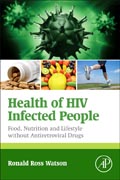
Health of HIV Infected People: Food, Nutrition and Lifestyle without Antiretroviral Drugs
Watson, Ronald Ross
Health of HIV Infected People: Food, Nutrition and Lifestyle Without Antiretroviral Drugs defines the supportive roles of bioactive foods, exercise, and dietary supplements on the health of HIV infected people who do not have access to resources or those who choose not to utilize antiretroviral drugs. Approaches such as the application of traditional herbs and foods are given careful definition by experts who define the risks and benefits of such practices within this important context. Readers learn how to treat or ameliorate the effects of chronic retroviral disease using readily available, cheap foods, and dietary supplements. Ultimately, this work delivers a current, concise, scientific appraisal of the efficacy of key foods, nutrients, dietary plants, and behavioral changes in preventing and improving the quality of life of HIV infected infants and adults who are not undergoing antiretroviral therapy. Covers the role of nutrients in the prevention and treatment of HIV-induced physiological changesDelivers important coverage on the relationship between HIV infection and infant feeding practice, along with public health policy recommendations in social and cultural contextProvides coverage of fitness and exercise regimens, physical activity, and behavioral and lifestyle changes on HIV infected individualsExplores food and treatment of obesity, diabetes, and cardiovascular disease in HIV infected patients, including those without antiretroviral therapeutic treatmen INDICE: Section I: Overview and Food1. Dietary supplements among people with HIV and vulnerability to medical internet misinformation; Seth Kalichman2. Eating coffee candy: HIV risk at Huli funerals; Philip Gibbs and Heather Worth 3. Infant feeding policies and HIV; Louise Kuhn4. Alcohol use and food insecurity in HIV disease management; Seth Kalichman5. Carotid intima-media thickness and plaque in HIV-infected patients on the Mediterranean diet; Klaudija ViskovicSection II: Nutrients and Lifestyle6. Nutritional treatment approach for ART naïve HIV-infected children; Marianne Oliveira Falco Sr. and Erika Aparecida Silveira 7. Nutrition therapy for HAART naïve HIV-infected patients; Marianne Oliveira Falco Sr.8. The role of nutrition training for health workers in addressing poor feeding practices and undernutrition among HIV-positive children; Junko Yasuoka, Bruno Sunguya, David Urassa and Masamine Jimba 9. Nutrition and Food in AIDS patients; Teresa Kokot10. Zinc Supplementation for Infants and Children with HIV Infection; Zhang Lingli11. HIV AIDS in India: A Nutritional Panorama; Deepika Anand and Seema Puri 12.Undernutrition, food insecurity, and antiretroviral outcomes: an overview of evidence from Sub-Saharan Africa Patou Masika Musumari13. How the HIV epidemic carved an indelible imprint on Infant Feeding; Hoosen Coovadia and Heena Brahmbhatt14. Nutrition care of the HIV-exposed child; Anju Seth15. HIV+ Patients Responded to Dietary Supplementation With Cysteine or Glutamine; Roberto Carlos Burini16. The role of micronutrients in the diet of HIV-1-infected individuals during retroviral therapy on other infections; Giuseppe NunnariSection III: Exercise and behavioral lifestyle changes in the Prevention and Treatment of HIV/AIDS nutritional changes17. Exercise and management of body weight in older people living with HIV; Joachim Voss18. Exercise treadmill test for the assessment of cardiac risk markers in HIV; De Lorenzo Andrea19. MEASURES OF PHYSICAL FUNCTION IN THE MANAGEMENT OF INDIVIDUALS LIVING WITH HIV/AIDS; Vagner RasoSection IV: Models of HIV: Lessons to be learned from animal viruses20. Animal Lentiviruses: Models for Human Immunodeficiency Viruses and Nutrition; Mitchel G. Stover and Ronald R. Watson 21. T cell number, nutritional status and HIV: The Cuban experience in the provision of food and nutrition care to people with HIV/AIDS; EM Linares Guerra
- ISBN: 978-0-12-800767-9
- Editorial: Academic Press
- Encuadernacion: Cartoné
- Páginas: 406
- Fecha Publicación: 01/06/2015
- Nº Volúmenes: 1
- Idioma: Inglés
